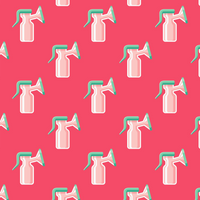ABOVE: © ISTOCK.COM, BORTONIA
Nature News recently featured an article stating that almost half of women in STEM either leave their profession or switch to working part-time after giving birth to their first child in the US. This is more than double the statistics on first-time fathers, although fathers in STEM also leave the field at an alarmingly high rate after entering parenthood. This begs the question, why are we letting this happen? And what can we do to change these numbers?
I had my first child, a daughter, in August 2017. I returned to work as a postdoc eight weeks later. Being a new mom in science had its own unique challenges—the open lab spaces meant that there was no office to pump in, and my daily experiments meant that my incubation periods or use of core equipment changed every day; sticking to a pumping schedule or even...
Throughout all these issues, I was not alone. I was fortunate to find a core group of new moms in STEM navigating these same experiences. Together, we formed a group at the University of Colorado called Milk and Cookies focused on helping scientists navigate their first year as new mothers.
We propose 10 ways STEM institutions can begin supporting mothers. A number of these are common to various professions, including parental leave, institutional child care, higher salaries, retirement and healthcare benefits, maternal mental health support, and lactation services. To implement these six reforms requires massive institutional if not nationwide investments.
But there are four of our proposals that can be enacted on smaller scales and by students and staff themselves:
(1) Dependent care at academic conferences. My husband (also a scientist) and I attended our first joint conference when our daughter was six months old. The resort offered daily childcare for an additional $145/day that we could not even remotely afford. Recently, Milk and Cookies started a Dependent Care Grant that awards new parents monetary funds to provide care for their child while doing the networking required to move forward in STEM careers. We lobbied for funding through our Office of Diversity and Inclusion, and the grant has become so popular on campus that each department is sponsoring an award as well. Each award is $500, so it allows an added caregiver to be present while the conference attendee can gain the necessary scientific insight she had signed up for.
(2) Pregnancy awareness and lab safety. In my position, I work with lentivirus, I use a whole-body irradiator, do mouse work, and use chemicals restricted to a fume hood. However, I was never given any insight into what I could and could not do in the lab while pregnant. Anything that I questioned, I googled. Milk and Cookies recently started providing regularly scheduled “pregnancy workshops” on campus that delve into topics such as navigating HR, laboratory safety, work ergonomics, and more. We have campus representatives from the departments of human resources, environmental health and safety, public health, the office of equity, and the women and gender center in one place to answer all questions a pregnant employee may have, no googling required. These workshops are held every three months, so that employees have the chance to learn how to best manage pregnancy in a laboratory setting early on in their pregnancy.
(3) Work/life supervisor. New mother support is often found under the auspices of several departments, with no centralized office or point person. Coming back to work from maternity leave is confusing and it seems like every new mother is given different directions and guidelines. Creating a position where one professional knows exactly how to navigate a woman’s professional journey from pregnancy to pumping would remove a large roadblock in the logistics of returning to work. A position like this would provide an advocate for change in large institutional policies such as parental leave, on-campus daycare, and the creation of a campus-wide lactation policy. Milk and Cookies is currently lobbying for this position to be created under the Office of Diversity and Inclusion.
(4) Community. Because of the current makeup of leaders in STEM, new mothers with PhDs are under-valued, under-hired, and under-promoted. Attending a support group such as Milk and Cookies with like-minded individuals helped me feel less alone in a male-dominated field. Milk and Cookies provides a safe place to socialize and pump, whether at group meetings or our newly created lactation lounges—complete with couches, refrigerators, and extension cords where multiple women can pump at once. These alleviate the strain on the always-booked lactation rooms, as well as provide socialization in an otherwise isolating environment. We also provide a speaker series that discussed everything from infant sleep to maternal mental health to pelvic floor therapy. This community eased my transition back to work and also provided new relationships in the process. Our goal is to make new moms feel heard, and to let them know they are not alone.
The retention rates of new moms in STEM fall as most women are just beginning their careers. This leads to a complete change in the culture and make-up of assistant professors, professors, and other high-ranking scientists. Recently, it has been reported that less than a third of full-time professors are women. Parenthood is affecting these numbers. In addition, early-career women scientists are lacking role models in our fields to show us how to be successful at being both a mother and a scientist, and this gender and parental imbalance has not changed in decades. Smaller, manageable, cost-effective initiatives like those Milk and Cookies launched might be the right answer, or at least a good start, in making women feel more supported in their STEM field.
Michele Hoffmann is a postdoc at the University of Colorado.
Interested in reading more?






